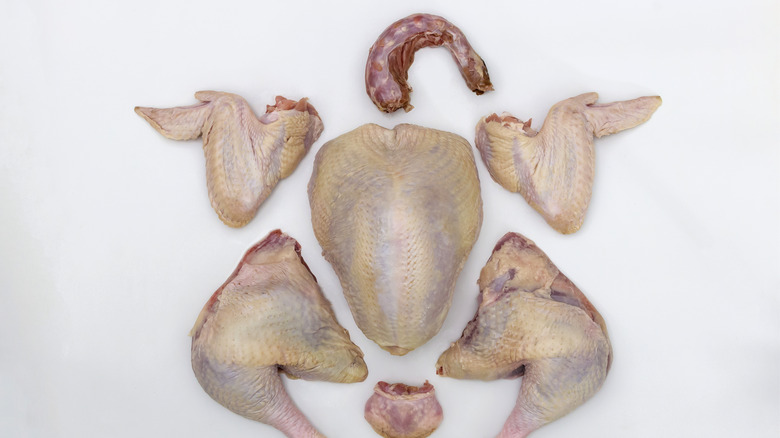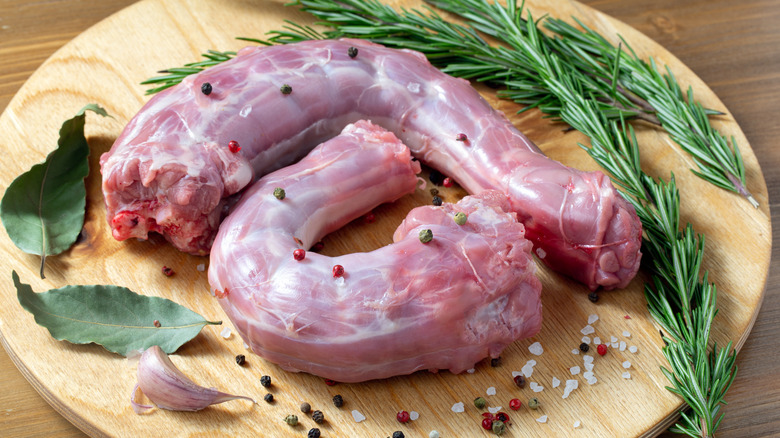Turkeys are big birds that yield a lot of meat, which is great for celebrations and large crowds. But theres more to a turkey than breast meat, thighs, and drumsticks — some of the most tender, succulent dark meat comes from the turkey neck, which you might be tossing away when preparing the bird to roast.
Turkey necks are an often overlooked and underrated gem in the world of poultry. While they might not be the first thing that comes to mind when you think of turkey, necks are a treasure trove of flavor. Packed with succulent meat and rich in collagen, they are perfect for making savory stocks, broths, and soups. The meat on turkey necks is also exceptionally tender, with a texture that practically falls off the bone when cooked properly. When simmered with aromatic vegetables and herbs, turkey necks release a deep, savory essence that can serve as the foundation for amazing gravies and sauces.
Turkey necks are an underrated and often overlooked part of the bird. But beyond being a delicious addition to soups and stews, turkey necks actually offer some impressive health benefits. They are packed with protein, vitamins, minerals, and collagen
So are turkey necks healthy to eat regularly? Let’s dive into the nutrition facts, health benefits, and best ways to eat turkey necks.
Turkey Neck Nutrition Facts
Here are some of the main nutrients found in turkey necks:
-
Protein: 25g per 3oz serving, providing over half the daily value. Turkey necks are a rich source of this essential muscle-building nutrient.
-
Vitamin B12 2mcg per serving, providing 90% DV Supports red blood cell formation and neurological function.
-
Vitamin B6 1mg per serving 44% DV. Plays a role in over 100 enzyme reactions in the body.
-
Zinc: 6mg per serving, 56% DV. Boosts immune health and wound healing.
-
Iron: 2mg per serving, 22% DV. Needed to transport oxygen in the blood.
-
Selenium: 55mcg per serving, 100% DV. A potent antioxidant that protects cells from damage.
-
Collagen: Abundant. Provides structure to skin, bones, connective tissues.
Turkey necks provide this stellar nutrition in just a 152 gram serving. They are high in protein and essential vitamins and minerals, while being low in fat and calories.
Potential Health Benefits of Turkey Necks
Due to their excellent nutrition profile, regularly eating turkey necks may provide these health benefits:
-
Stronger bones: The calcium and phosphorus support bone mineral density.
-
Improved immunity: Zinc and selenium boost immune cell function.
-
Muscle growth: The high quality protein assists muscle building and repair.
-
Heart health: B vitamins help lower homocysteine, a risk factor for heart disease.
-
Healthy skin: Collagen improves skin elasticity and hydration, reducing wrinkles.
-
Joint support: Collagen strengthens connective tissues and may reduce osteoarthritis risk.
-
Injury recovery: Collagen helps repair damaged ligaments, tendons, and muscles.
More research is still needed, but the nutrition in turkey necks shows promise for these health benefits.
Tips for Cooking Turkey Necks
Turkey necks can be prepared in several delicious and nutritious ways:
-
Braising/simmering: Cook in broth, wine, or barbecue sauce until tender.
-
Baking: Season with herbs and spices and bake in the oven.
-
Grilling: Grill over medium-high heat, basting with sauce.
-
Slow cooker: Add veggies and seasonings, cook on low for nutritious stew.
-
Frying: Fry in oil on the stovetop until browned and crispy.
-
In soups/stews: Add to dishes like chili, vegetable soup, minestrone.
-
As substitute: Use ground turkey necks instead of ground meat in recipes.
Aim for low, slow cooking methods like braising to bring out the best texture and flavor. Try serving with roasted vegetables, mashed cauliflower, or sweet potato fries.
Selecting and Storing Turkey Necks
When shopping for turkey necks:
-
Look for plump, meaty necks without blemishes.
-
Opt for fresh but frozen works too.
-
Estimate 1 pound of necks per person.
-
Store fresh necks for 2-3 days max in the fridge.
-
Freeze for 3-4 months for longer storage.
-
Thaw frozen necks in the fridge before cooking.
Are Turkey Necks Safe to Eat?
Turkey necks are safe to eat when fully cooked to an internal temperature of 165°F. Be sure to:
-
Clean necks thoroughly before cooking.
-
Cook to proper temperature using a meat thermometer.
-
Refrigerate leftovers within 2 hours and use within 3-4 days.
-
Reheat leftovers to 165°F.
-
Avoid cross-contamination by keeping raw necks separate from other foods.
Following basic food safety practices is important when handling and cooking any raw poultry.
The Verdict on Turkey Necks
Turkey necks are an underappreciated source of protein, essential vitamins and minerals, and collagen. Consuming turkey necks regularly may promote bone health, immunity, muscle growth, heart health, and skin elasticity.
Turkey necks can be incorporated into soups, stews, tacos, sandwiches, and more. Their stellar nutrition and versatility make them a wise and delicious addition to a healthy diet. Just be sure to cook thoroughly and practice proper food safety when handling raw turkey necks.

What is turkey neck meat?

Exactly as youd expect, turkey neck meat comes from the long tube-shaped neck of a turkey, and youll usually find it tucked inside the whole bird. Made of roughly equal parts meat and bone, it shares a culinary kinship with other bone-adjacent cuts like oxtail, short rib, and shank, boasting a deeper flavor than the white meat of turkey breasts and wings. Unlike those larger muscle groups, turkey neck meat consists of numerous small muscles — once cooked, it transforms into tender, juicy shreds that can be lifted from the bones, making it a versatile addition to a wide range of recipes.
Turkey neck can be used as a shredded addition to beans, soups, and sauteed greens, or served on the bone, smothered in richly flavored sauce. But the culinary magic doesnt end there: The simmering liquid used to cook the turkey neck meat becomes rich bone broth, brimming with nutrients. The broth can be then used for sauces, gravy, and soup with deep turkey essence.
How to cook turkey necks

To prepare turkey necks, start by giving them a thorough rinse and a gentle pat dry, ensuring theyre free from any surface impurities. While youre at it, check for any excess flaps of skin or fat, which can be easily trimmed before proceeding. You can slice the necks into smaller segments if youre serving them on the bone, or you can choose to cook them whole, as long as they fit into your pan.
Youll want to lightly season and brown the turkey necks by pan-searing them all around. This step not only enhances their taste but also contributes to the depth of the final dish. Once the necks are golden brown, immerse them in liquid for a slow, low braise, generously flavored with aromatics such as onions and bay leaves. Theyll need to simmer for about an hour; youll know theyre ready when the meat begins to easily flake off the bone. Whether youre cooking the necks to use the meat in another recipe or simply to eat as is, the cooking process is the same if you want them to yield tender, flavorful meat.
Super Tender Smothered Turkey Necks | Comfort Food | Chef AldenB
FAQ
Is eating turkey neck healthy?
Nutritional value of turkey necks
Much like other poultry, turkey neck meat is also a good source of protein and micronutrients. Turkey delivers a range of several B vitamins, including B3 (niacin), B6 (pyridoxine), and B12 (cobalamin), which are crucial for energy metabolism and the health of the nervous system.
Are turkey necks high in cholesterol?
Turkey, neck contains 3 g of saturated fat and 171 mg of cholesterol per serving.
Is neck meat good for you?
… necks from Prime Nosh are not only a culinary delight but also a powerhouse of nutrients that support skin vitality, joint health, and overall wellness
Is turkey neck considered red meat?
Generally, meat from mammals such as cows and calves, sheep, lamb and pigs is considered red meat, while rabbit, chicken, and turkey meat is considered white meat.
Are turkey necks good?
Turkey necks are an often overlooked and underrated gem in the world of poultry. While they might not be the first thing that comes to mind when you think of turkey, necks are a treasure trove of flavor. Packed with succulent meat and rich in collagen, they are perfect for making savory stocks, broths, and soups.
Is Turkey Neck good for weight loss?
Turkey is one of the finest and richest meat sources. Turkey necks are especially delectable and what fun it is to pick up the meat from the neck bone. The necks can be cooked separately to make a tasty treat. You have to work on the turkey necks, picking on the meat which is good for people trying to lose weight.
Are turkey necks safe to eat?
There are several risks associated with feeding Turkey Necks including bacterial contamination, intestinal blockages, constipation, and choking. Turkey necks are a by-product of the meat industry, where welfare standards may vary so try to buy free-range products with animal welfare accreditation (RSPCA, Red Tractor, Soil Association).
Is Turkey Neck good for dogs?
Feeding ground turkey necks will help your dog’s teeth to be clean. Also, turkey necks have only 10 percent of bone that will be fine to your dog. But, you have to check whether your dog swallows the turkey meat as a whole. In such cases, train your dog to chew it. Overall, turkey neck is a great food to your dog.
What is a turkey neck?
As the name suggests, turkey necks refer to the entire neck of the turkey, without the head, skin, or crop (a muscular pouch that stores food). The neck contains the spine (including the bones or vertebrae), the trachea (windpipe), muscle, and connective tissue.
What can you do with turkey neck meat?
Turkey neck can be used as a shredded addition to beans, soups, and sauteed greens, or served on the bone, smothered in richly flavored sauce. But the culinary magic doesn’t end there: The simmering liquid used to cook the turkey neck meat becomes rich bone broth, brimming with nutrients.
